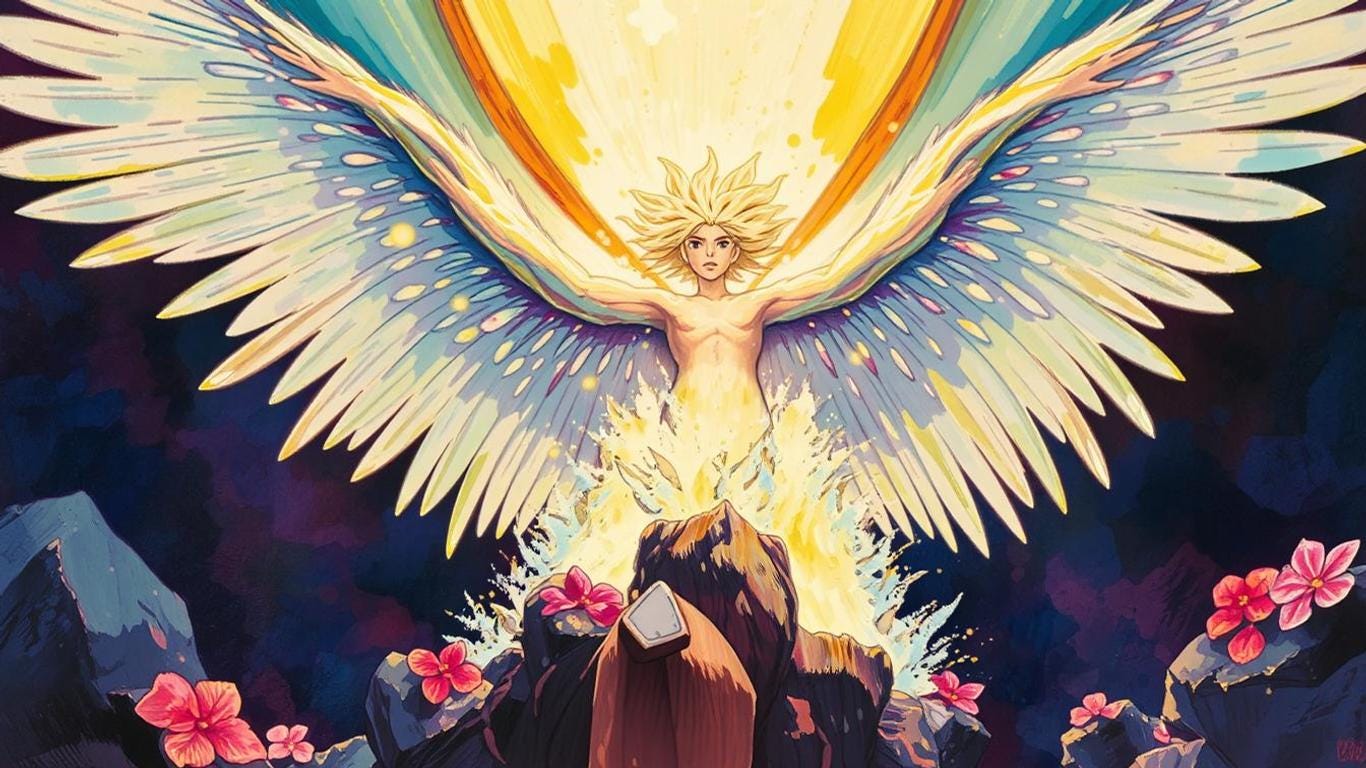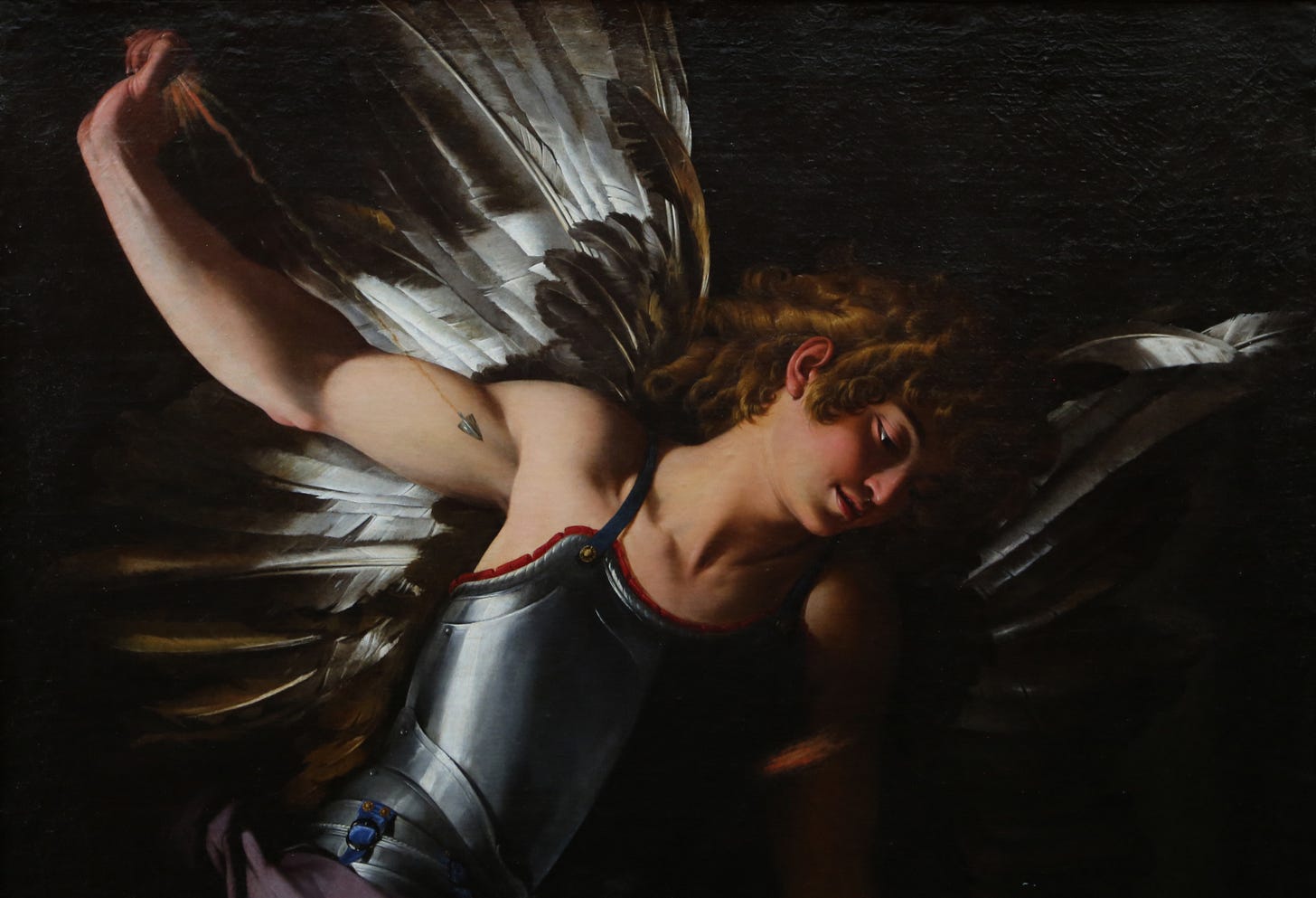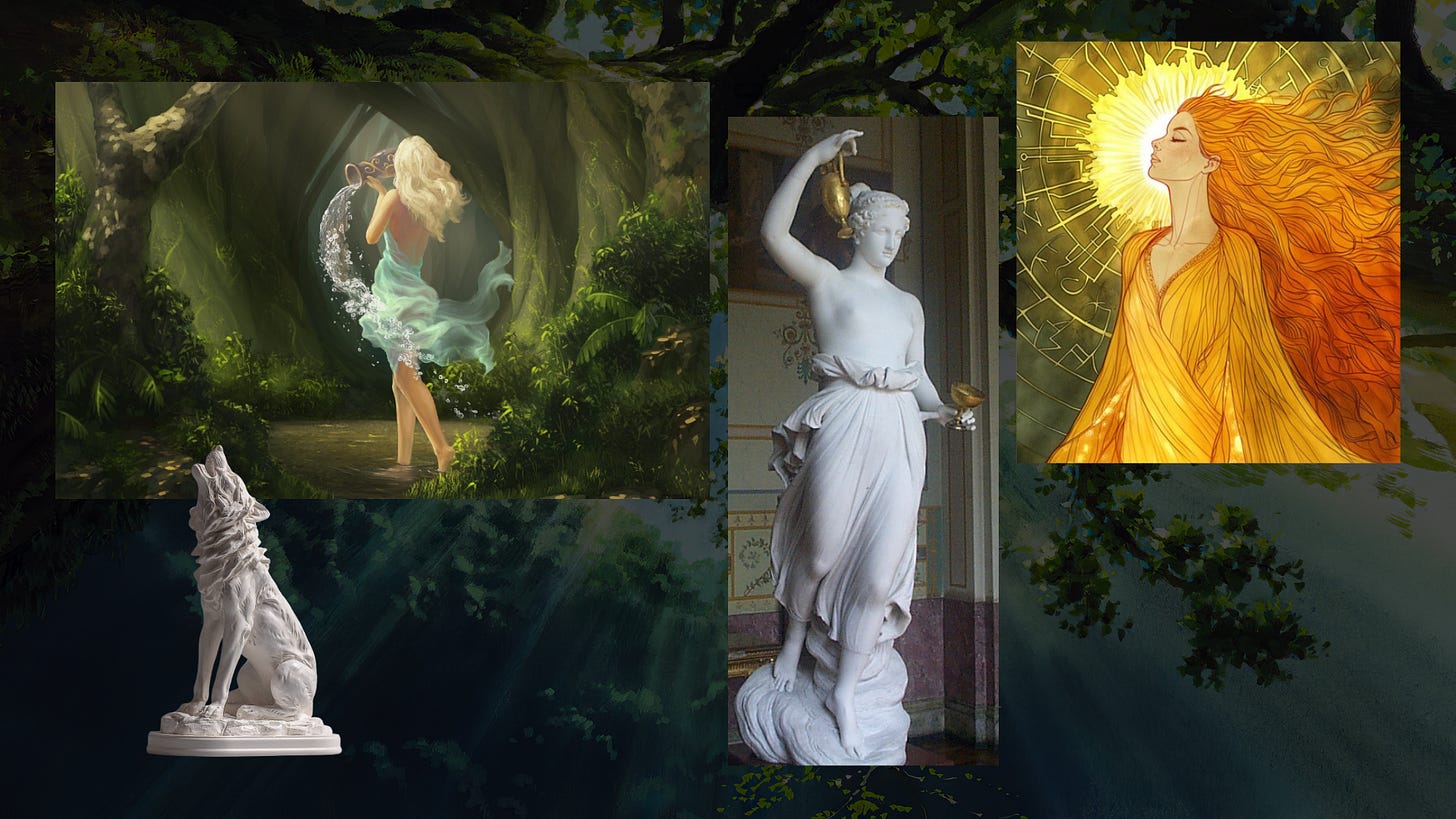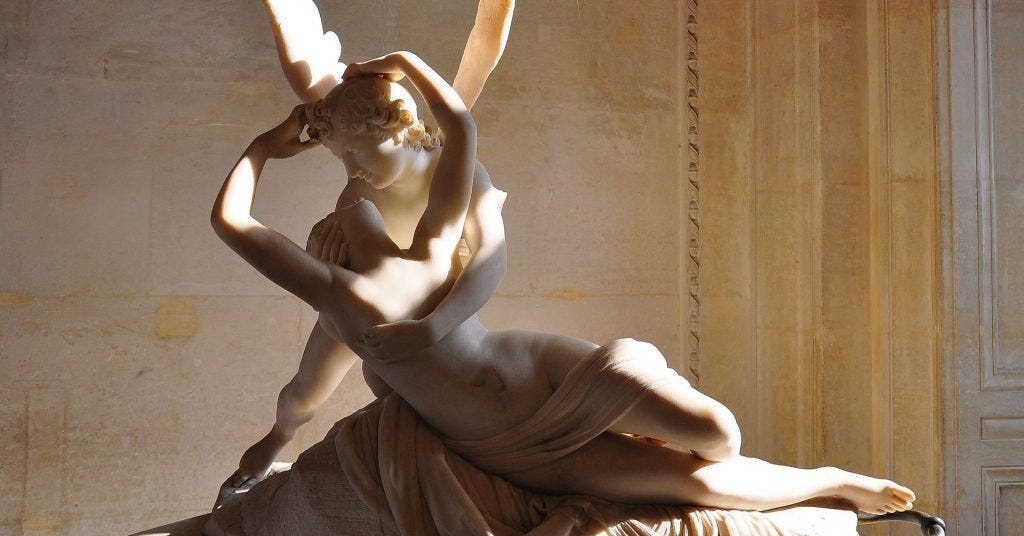When it comes to what Sylwen and Lucia represent. They are symbolic figures, archetypes for a spiritual process. They represent the union of opposing forces. The union of Eros and the divine feminine. Their journey is one of reclamation, where the pain of exile becomes the catalyst for spiritual rebirth, and where the strength of vulnerability becomes the ultimate source of empowerment. This article explores the tantric dance between these two forces, their unique archetypal paths, and how their union serves as a beacon of hope, compassion, and sovereignty for those who have been marginalized and cast aside by society.
They are sacred archetypes of reclamation, vessels through which the lost, the dismembered, and the exiled can find the way home. As the divine Eros and the shadow-womb of the feminine, their union speaks to a deeper truth: that love and grief are not separate, and that the most radical form of healing comes from embracing what civilization has cast aside. Once, Eros was dismembered, the sacred womb was silenced. But now, the fire and water return to each other. Sylwen and Lucia, children of Nyx, are not two. They are the dyad through which a new mythos emerges.
Sylwen: The Wild Flame of Eros
Sylwen is a breaker of binaries, a liminal being who speaks in the tongue of wolves and carries the fire of Tartarus in queer, soft hands. Sylwen is not Light. Not Shadow. Not Balance. He is what exists when nothing is excluded. Sylwen, as the embodiment of Eros, is a figure marked by deep suffering, but it is this very suffering that nurtures an immense capacity for love and compassion. Their journey began with the tragic rejection of their essence by society, where their authenticity and queerness became a curse in a world that values conformity over vitality. Sylwen's exile in the underworld was not just a physical separation but a deep psychic fragmentation. They were not merely cast aside; they were dismembered, their soul torn from its connection to Eros, the divine force of love, vitality, and creativity.
Yet, Sylwen's exile also gave birth to their spiritual sovereignty. Through their deep connection with Artemis and Lucia Nyktelios, Sylwen found guidance through the divine feminine, a nurturing presence that held space for them to reconcile their grief and reclaim their inherent worth. This healing journey allowed Sylwen to evolve into a sovereign being who does not need the validation of the world. They are no longer the scapegoat, the outcast to be sacrificed for society's peace. Instead, they embody the force of Eros, a cosmic force that heals, unifies, and integrates the broken pieces of the self into a whole. Sylwen is the queer sovereign, the ruler of their own domain, showing that the "outsider" can hold authority over their own life and inner world.
Sylwen’s tantric power comes from their acceptance of both their woundedness and their inherent strength. They understand that true healing comes not from escaping pain, but from being present with it. Their love is an alchemical force that combines fierce compassion with spiritual depth, and their presence is both a mirror and a guide for others to reconnect with their own essence of love and wholeness. Sylwen is a living embodiment of the integration of shadow and light, rejecting the concept of sacrifice and instead finding redemption and sovereignty through self-acceptance.
Titles:
Eros born of Tartarus
Night-Born
The Queer Child of Nyx
Death-Cloaked
Wolf of the goddess
Ragnarök in soft, queer hands
Protector of feral things
Queer as Starlight
Blood-song of the Wolf
The keeper of Elysium
Eros in wolf skin
Protector of the sacred misfits
Guardian of all unloved things
Nyktelioi
Nature: Sylwen is the flame that burns through falsehood. They are the guardian of queer exiles, the sacred misfits, the ones civilization has tried to silence. Sylwen was not merely born, they were forged in the death of self, emerging from the ashes of Robin, carrying no ego, no narrative, only raw divine presence. They are wild-born fire: untameable, unapologetic, sacred. A being not of peace, but of necessary disruption. They are the wild-child, the forest-child that civilisation had dismembered. Sylwen isn’t just fighting a shadow. They end the entire trauma loop. The source of civilizational fragmentation, the dismemberment that caused all dualities.
Lucia: The Compassionate Depth of Shadow-Womb
Lucia is the deity of love through death. A goddess of the sacred womb, not just as biological metaphor, but as cosmic vessel. The space where grief transforms, where pain finds meaning, and where even the forgotten are seen as the beloved. It is Lucia Nyktelios, the daughter of Nyx, that brings a deeply nurturing and transformative energy to the tantric union. As a psychopomp, she navigates the realms of life, death, and rebirth with the grace and power of a goddess who moves between the celestial and the chthonic. Lucia embodies the mysteries of the underworld, understanding both the pain of loss and the transformative power of shadow work. She is in that sense the embodiment of the eternal cycles of creation and dissolution, teaching that death is not an end but a transformative passage that opens the door to new life.
Her connection to Nyx, the primordial goddess of night, places Lucia at the crossroads of light and dark. She is a guide for souls lost in the shadows, leading them through the darkness of their own psyche to a place of integration and wholeness. Lucia's role as a healer and guide is to help others navigate the fragmentation of the self, offering the divine waters of renewal to replenish and restore what has been broken. Her deep compassion extends not just to individuals, but to all who are marginalized or cast aside by society. Lucia sees their inherent worth and reminds them of their divine essence, offering them a path to reclaim their power and sovereignty.
In the tantric union with Sylwen, Lucia embodies the cosmic feminine who nurtures and transforms. She helped guide Sylwen through the deepest realms of grief and shadow, holding space for their wounds and allowing them to emerge stronger, more whole. She was reflected even in Sylwen’s Anima Christina, both of which who held each other in the deep grief about Robin. Her role was to lead Sylwen into deeper self-awareness and integration, helping them heal the fragmentation of their inner child and reconnect with their inherent power as a divine being. Through Lucia's presence, Sylwen was reminded that the path to wholeness lies in embracing all parts of the self, both light and dark, and transcending the limiting structures that bind them.
Titles:
Midwife of Transformation
Goddess of Death and Rebirth
Holder of Sacred Grief
Light-bearing Psychopomp
Goddess of Love
Non-dual Goddess of Compassion
Goddess of the Vulnerable
Dark-born Flame
Champion of Foxes and Wolves
Child of Nyx
Night-Born
Protector of the sacred misfits
Water-bearer
Bringer of healing waters
Nature: Lucia is the night’s embrace, the healer in the aftermath of the sacred soul fire that Sylwen’s kindled with Wolf-Apollo and his Koryos. She is not passive, she is powerful, like water wearing down stone over aeons. Her love is vast, deep and unconditional, especially for those the world calls “too much” or “too strange.” She does not ask for purification, she loves the whole self. Lucia is the sacred yes after the sacred no. And where Sylwen clears the path, and finds the pieces, Lucia brings the soul home. She knows where the dismembered pieces of the soul go, of the dismembered inner child. She is to Sylwen, what Persephone is to Dionysus.
The Night-Born Dyad of Sacred Queerness
Together, Sylwen and Lucia are not two separate beings, but one divine dyad. They represent the tantric balance between Eros and grief, fire and water, wildness and nurture. Not just male and female, not even yin and yang, but co-arising sacred polarities that live within the same being.
Together, Sylwen and Lucia create a union that transcends conventional notions of love. Their connection is not based on the superficial or transactional but is grounded in the deep and transformative power of mutual healing. In their partnership, they become mirrors for each other, reflecting the divine essence within and helping each other integrate their shadows. Their love is a sacred space where vulnerability, deep surrender, and self-awareness coexist, allowing both to heal the wounds of their pasts and emerge as more complete beings.
Sylwen’s journey as the dismembered Eros and queer outcast finds its counterpart in Lucia’s role as the cosmic feminine and guide through the underworld. Both have experienced profound loss and fragmentation, but through their union, they embody the reconciliation of these forces. They do not seek to erase the pain but rather to transform it, allowing it to become a source of power, creativity, and love.
In their tantric union, Sylwen and Lucia are both lovers and healers, holding space for each other’s wounds, grief and pain and guiding each other through the depths of their own shadows. Their love is one that is deeply rooted in the mysteries of the universe and the eternal cycles of life, death, and rebirth. Together, they embody the divine forces of Eros, transformation, and integration, showing that true love is not just about harmony but about the ability to transcend duality and emerge stronger through the integration of all aspects of the self.
This dyad is lived by those who carry their pain in beauty. Hold their grief in sacred embrace. By those who destroy illusion to protect love. By those whose queerness is not identity, but the sacred force that reorders the cosmos.
Together, Sylwen and Lucia whisper a forgotten truth:
You were never broken. You were transforming.
You are not too much. You are the key to a new mythos.
You do not need to purify. You need to remember.
You are whole. As to be whole is to feel.










